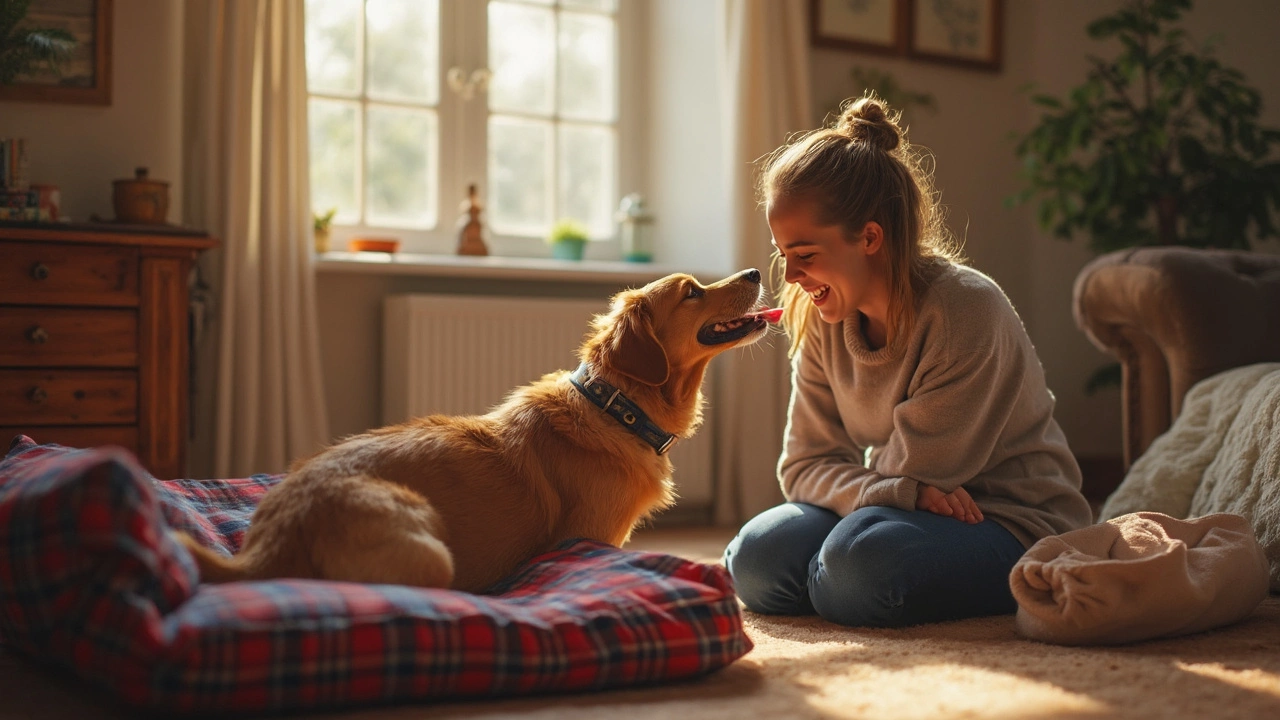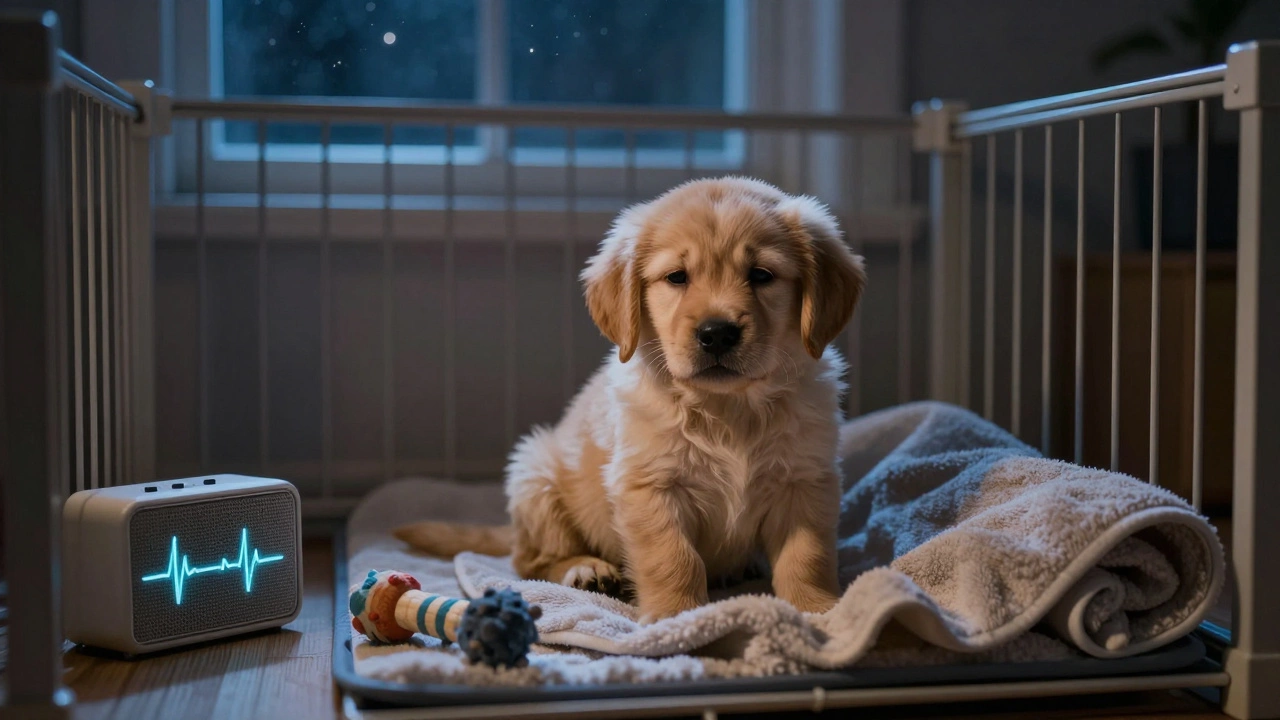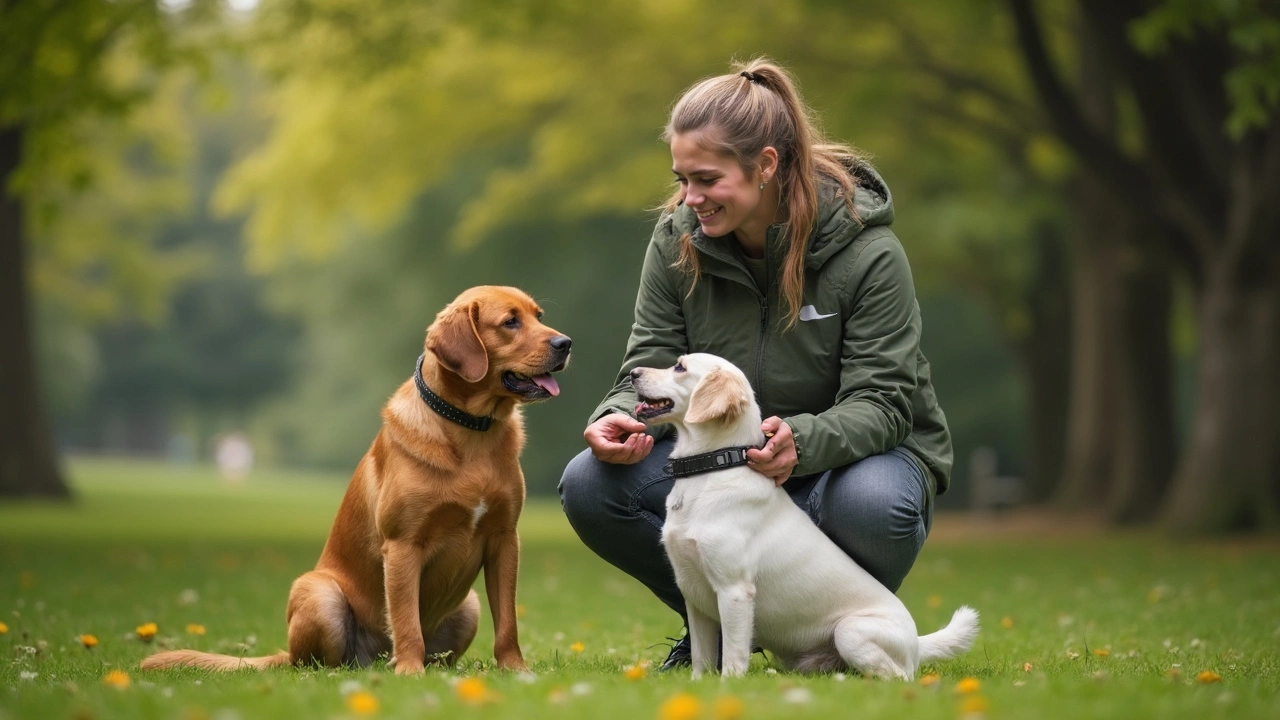Your dog jumps on the bed and starts licking your hand like it’s coated in gravy. Sound familiar? Most dog owners see licking as a cute sign of love, but there’s more going on under that slobbery surface.
Licking isn’t always just an invitation for cuddles. Sometimes, it’s your dog’s way of getting your attention. Think about it—dogs don’t have many ways to tell you they’re hungry, anxious, or just in the mood for some playtime. If your dog climbs onto their bed and gives you a few licks, it could be a simple “Hi, I’m here,” or even, “Let’s go for a walk.” It can also be a way for dogs to show you trust and respect. Licking has been a natural part of dog communication since they were tiny pups nursing from mom.
But licking isn’t always fun and games. If your dog won’t stop licking you, the bed, or even themselves, there might be more going on, like boredom, stress, or a health issue. Watch for patterns—do they always lick after eating or when you get home? Noticing these habits can reveal what your dog is really feeling.
- Why Dogs Lick: The Real Reasons
- When Is Licking a Problem?
- How to Respond to Excessive Licking
- What Licking Says About Your Dog’s Mood
- Hygiene and Dog Beds: Keeping Things Clean
Why Dogs Lick: The Real Reasons
Ask any vet or trainer about dogs and you’ll hear the same thing: licking is normal, natural behavior. But it’s not just about showing love or wanting your attention. Let’s break down what’s really going on when your dog gets their tongue into action.
First up, licking is one of the first things a puppy learns. Mom licks the pups to clean them and help them start breathing, and pups lick her for milk and comfort. It sticks around in adult dogs as a go-to way to say “Hey, I like you” or “Notice me.” Studies from Cornell University show that licking releases endorphins in a dog’s brain. This means dogs actually feel calmer and happier when they *lick* things—especially their favorite human.
“Licking is a form of social bonding and communication in dogs. It can mean anything from affection to seeking information about their environment.” — Dr. Marty Becker, veterinarian and author
Dogs don’t just lick people for social reasons. Sometimes they do it to check out interesting tastes or smells. Maybe you spilled a little food, sweated after a jog, or used lotion. Their super-sensitive noses pick up scents you’d never notice, and licking helps them get even more info.
Here’s why dogs might lick you or their dog beds:
- Bonding: Licking is a sign of friendship and respect, both to humans and other dogs.
- Seeking attention: Some dogs quickly realize licking gets a fast response from you—maybe pets or a treat.
- Exploring: Canines learn about the world through taste. If you smell different, they want to figure it out.
- Stress relief: Licking can calm them when they’re nervous or bored.
- Health issues: Sometimes excessive licking means allergies, pain, or other health troubles. Check with your vet if you notice a big change.
| Reason | How Common? |
|---|---|
| Affection/Bonding | Very common |
| Attention-seeking | Common |
| Taste/Exploration | Common |
| Stress/Nervousness | Moderate |
| Medical Issues | Less common |
The main thing to remember? Occasional licking is a healthy, normal part of your dog’s life. But if you notice licking turning into an all-day habit or they’re fixated on one spot, it might be time to investigate further.
When Is Licking a Problem?
Sure, it’s normal for dogs to lick you after a long day apart or during cuddle time, but sometimes licking goes overboard. If your dog can’t seem to stop licking—whether it’s you, their paws, or their dog beds—it’s probably not just affection. Non-stop licking can point to boredom, stress, or even an underlying health problem.
Let’s break down the warning signs. If your dog’s licking is so frequent that they’re making a bald spot or their skin looks red, that’s a problem. Some dogs lick their paws or the air when they’re anxious, kind of like how people bite their nails. According to Dr. Jerry Klein, chief veterinary officer for the American Kennel Club, “Obsessive licking often starts as a way to relieve stress, but it can quickly become a hard-to-break habit.”
“If you notice sudden changes or a spike in licking, talk to your vet. This can be the first sign of allergies, pain, or even an infection.” — Dr. Jerry Klein, AKC
So what should you look out for?
- Licking specific body parts raw or bald
- Licking the same spot on floors, furniture, or their own bed
- Sudden or dramatic increase in licking without a clear reason (like food spills)
- Pain, limping, or changes in behavior paired with licking
If any of these pop up, don’t brush it off. Grab your phone and schedule a check-up. With dogs, early action makes a huge difference.
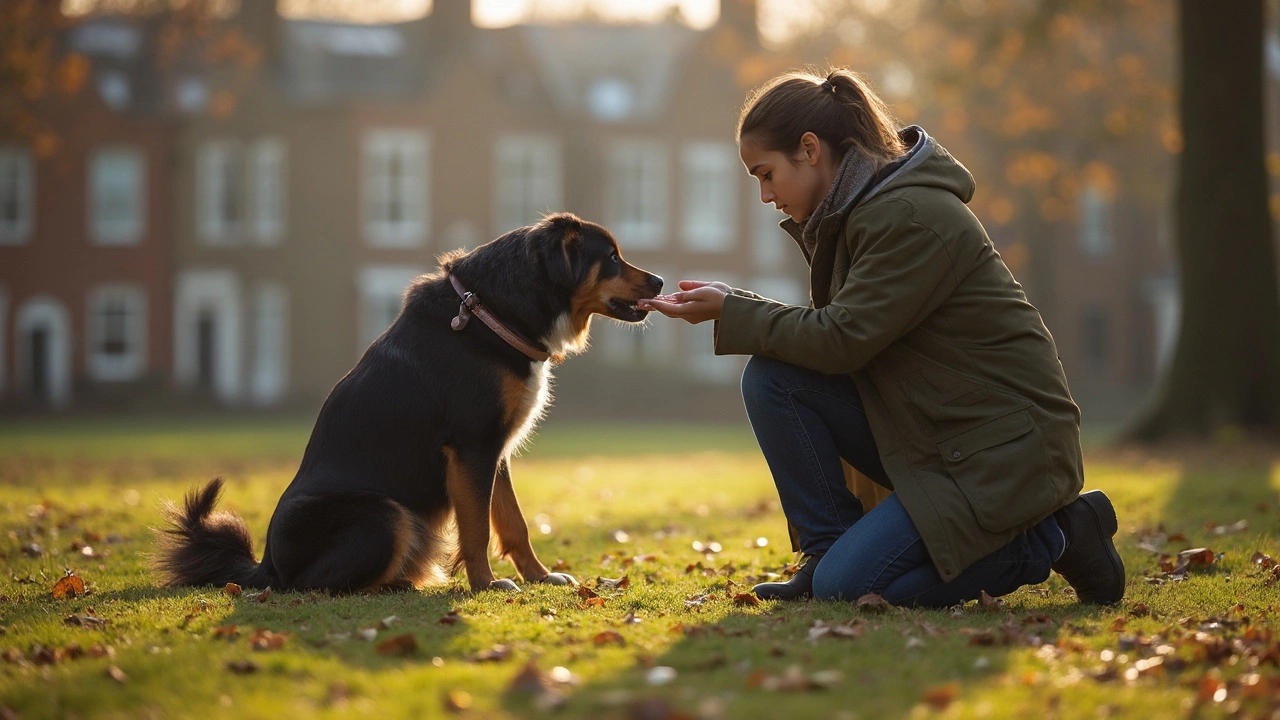
How to Respond to Excessive Licking
If your pup turns into a licking machine, it might be time for a plan. First, know that dogs lick for attention, comfort, pain, or boredom. Figuring out why your dog is going overboard is half the battle.
If you want to get a handle on things, take these steps:
- Rule out any medical issues. Sometimes excessive licking means itchy skin, pain, or a sign of allergies. A quick checkup with your vet always beats guessing.
- Don’t accidentally reward the licking. Pushing your dog away or yelling doesn’t always help—some dogs just see this as extra attention. Instead, calmly ignore them or redirect their energy.
- Give them something else to do! Interactive toys, puzzle feeders, or a good chew can shift their focus away from constant licking. A tired dog doesn’t have the energy to obsessively lick.
- Set clear rules. If licking is a habit during a certain time (like right before bed or when you’re on the couch), use simple commands like "sit" or "down" paired with a treat for calm behavior.
- Make their environment calm and comfy. Anxiety ramps up licking, so a cozy, familiar dog bed in a quiet spot can help some pups settle down.
Most importantly, stay patient. Dogs don’t mean to bug you—they’re just doing what feels right to them. Putting these steps into action can make a real difference, and before long, you’ll both enjoy a little more peace (and a lot less slobber).
What Licking Says About Your Dog’s Mood
If you pay close attention to when and how your dog licks, you can learn a lot about how they’re feeling. Licking isn’t just a random habit—it’s a way for dogs to communicate what's going on inside their heads.
First off, licking is most often tied to affection. If your pup licks your face or hands when you sit down together, they’re probably feeling happy and at ease. Some behaviorists say it’s similar to the way puppies lick their mom’s face—it means comfort and connection. That’s why you’ll notice dogs licking you when they flop beside you on their dog beds or cuddle up at home.
But licking is just as common when your dog’s uncomfortable or nervous. Some dogs start licking more when stressed out by loud noises, new people, or changes in routine. Their licks might be quick, almost frantic, and they might keep licking the same spot. If you see this, your dog could be using licking as a sort of coping tool—something to feel better when things get overwhelming. It's a bit like a person fidgeting when they’re anxious.
Dogs also use licking as a way to calm situations—sort of like saying, "Hey, I’m friendly here." You might see this with puppies who lick older dogs, or when your dog licks your hand while you’re cleaning their paws or trimming their nails. This is usually a sign of submission or seeking reassurance.
Sometimes, a sudden spike in licking can mean something is off health-wise. Dogs might lick a certain part of their body if it hurts or if their skin feels weird due to allergies. Or, if they’re licking you way more than normal, it could be their way of telling you that they need some extra comfort or medical attention.
- Slow, relaxed licking: Usually means your dog is happy and wants attention.
- Fast or repetitive licking: Can signal anxiety, nervousness, or boredom.
- Licking a sore spot: Might be a health issue—check for cuts, rashes, or swelling.
- Licking paired with whining, hiding, or shaking: This could be a cry for help or comfort.
Bottom line: watch your dog’s whole body and the situation around them. Licking can mean your buddy is cheerful, but sometimes, it’s a sign they need help or a change in their environment. Your dog’s tongue is their way of talking, so it pays to listen.
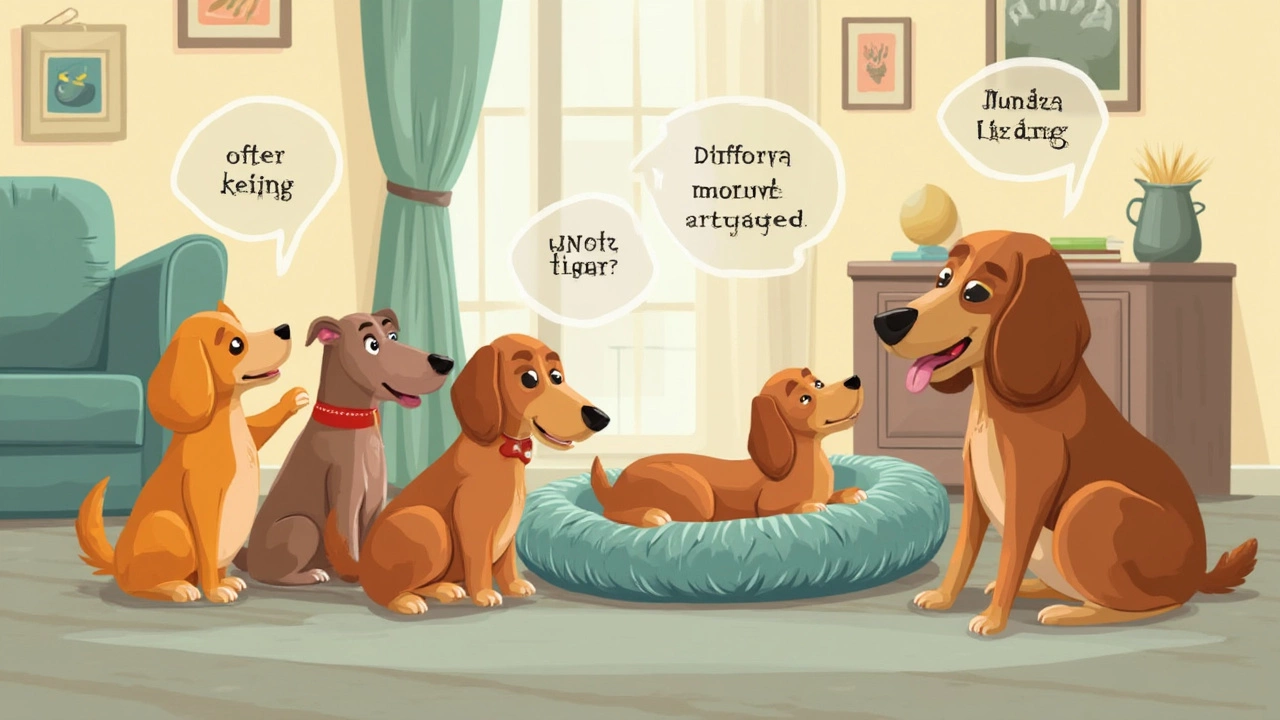
Hygiene and Dog Beds: Keeping Things Clean
If your pup loves licking you—or everything in sight—some of that slobber is bound to end up on their bed. It’s no secret that dog beds can get gross fast, especially if your dog’s a serial licker. Drool carries all sorts of germs, plus bits of food and dirt from outside. Letting that build up in a dog bed? Not the best move for your home or your dog’s health.
Washing your dog’s bed regularly is a game changer. Aim for once a week if your dog is a big licker, especially during shedding season or after muddy adventures. Most dog beds come with removable covers, so toss those in the washing machine using a mild, pet-safe detergent. If the whole bed fits in, all the better. Make sure it dries completely—mold loves damp fabric.
Even if you’re wiping your dog’s paws and fur after walks, those beds can still pick up a lot. Here’s a quick checklist to keep things fresh:
- Vacuum the bed often to get rid of fur, crumbs, and dirt.
- Spot-clean any slobber stains or accidents as soon as you see them.
- Disinfect the sleeping area every couple of weeks with a pet-safe spray.
- Replace beds that get too worn or have stubborn odors you just can’t beat.
If you notice your dog licking the bed constantly, it might signal a need for a deeper clean—or could point to allergies or boredom. Watch for any change in their licking habits, especially if it’s linked to irritated skin or persistent scratching. Clean surroundings make a big difference for a happier, healthier dog.
Keeping your dog licking under control isn’t just about stopping them from slobbering all over you. It also means keeping their favorite hangout—the bed—clean and comfortable for their daily naps.

